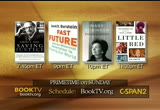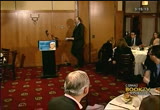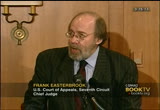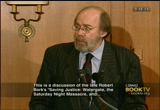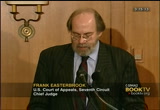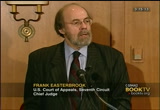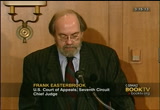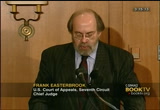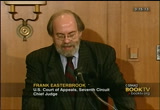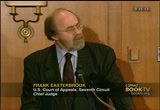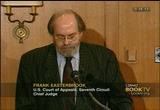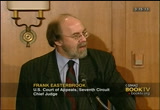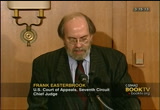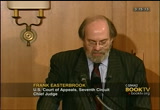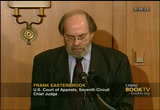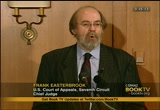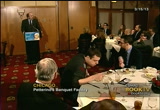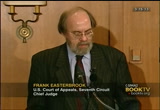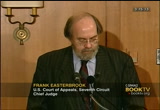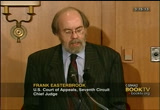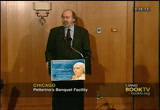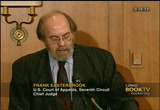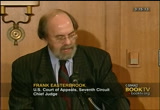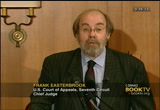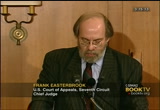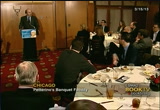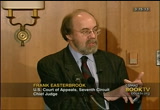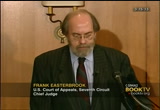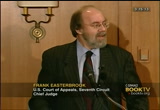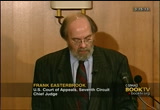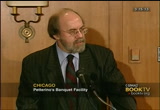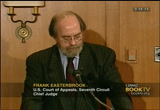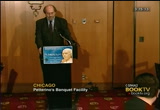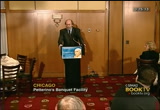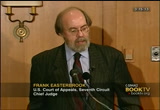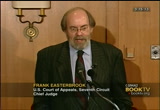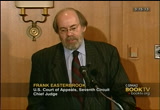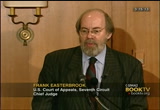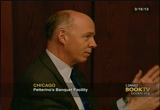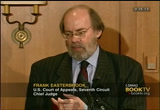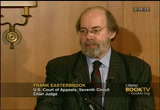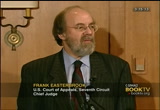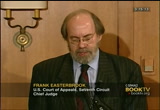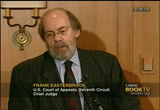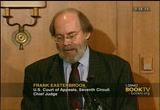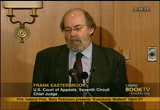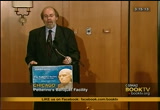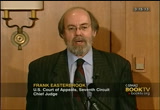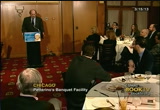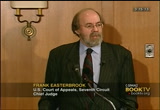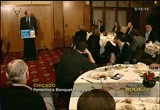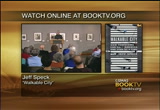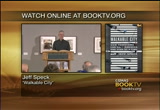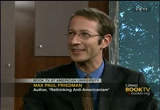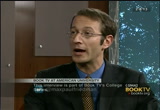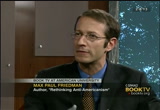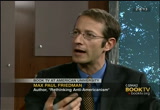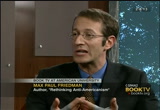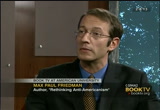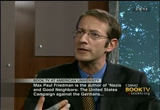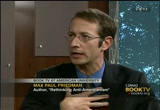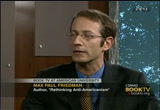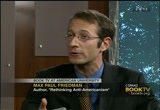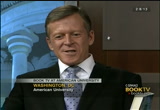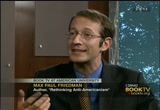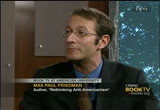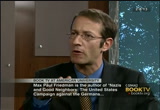tv Book TV CSPAN March 24, 2013 7:45pm-9:00pm EDT
7:45 pm
7:46 pm
"saving justice." and i'm here because i worked as one of bob's assistance for two and a half years we are friends between 1974 and his death last fall. but i need to open with a compression. i can't say very much about the book. i'll talk instead about bob bork, the man and solicitor general. the reason i can't say much about the book is his principal focus is his first six months on the job. she plead guilty and resigned as vice president when he persuaded the supreme court to stop justice douglas' crusade and the u.s. from persecuting the vietnam war. but he fired archibald cox as the watergate special prosecutor and appointed thee into risky to replace him. and when he served as acting attorney general for three
7:47 pm
months between the ted elliott richardson designed and william saxby was appointed. not bad for one's first six months on the job. the title saving justice comes from bob's decision not to re-sign this saturday night massacre, which by the way should've been called the saturday night involuntary manslaughter. [laughter] because nixon didn't plan it, but just wandered into it. bob believed the president has the authority to control everyone in the executive branch into fire and subordinate personnel. whether your president is wise to exercise that authority is for history to decide. the attorney general richardson had promised the senate that he would maintain a special prosecutor in place and he thought that he had to resign
7:48 pm
when nixon asked him to fire cox. the bork had not made any such promise in that the president to dig his own grave if he insists. he also thought they should not gain and certainly should not appear to be attorney. he planned to quit. richardson and william ruckelshaus deputy attorney general talk to that of resignation. there is no line of succession in the department of justice after the solicitor general. so if bob had walked the plank, the department of justice would have been leaderless. no one knew who the president might install. richardson, ruckelshaus will fear that it would be a political shell, leaving the assistant attorney general in the department leadership to re-sign and crippling the department. so bob bork see justice by
7:49 pm
stating. had he quit in protest that he probably would've been treated as a national hero and confirmed in 1987. do it to paul stevens. he was on the list photography be sent be sent to president ford of possibilities. but heavy quit combat the nation as a whole would've suffered. so he stayed in office, in the sg's office. he was so determined not to benefit that he turned down an opportunity to be appointed as attorney general. he turned down the chance to work from the attorney general smart aleck in office. he avoided the attorney general's private dining room and even turned down the attorney general chauffeur limousine or the time he was acting attorney general. i can't say much more about those times. they occupied the last six month
7:50 pm
of 1973 united not arrive until may 1974. but everything bob bork says in his book he set in 1974. richardson, ruckelshaus and the people who work with him most closely then such as admin kitchen keith jones tell the same story. and bork's narration is entirely consistent with the man i knew for 40 years. intellectual, considering consequences before acting and absolutely honest. he's also the funniest man i ever met. that didn't come through in his 1987 hearings that the book is full of wit. the life of a solicitor general at the life of a judge's reactive. other people decide the solicitor general control of the government presentation to the supreme court. the petitions to file, what responses to file, oral argument
7:51 pm
in the solicitor general also decides in the government will appeal an adverse decisions by district court or the court of appeals. the solicitor general has authority to decide when a federal they meet the eye and the supreme court or court of appeals. it's a broad portfolio that requires a large base of knowledge plus the ability to learn fast. the solicitor general does not control with y and doesn't start the process within the justice department feared cases that a writer for out to litigating division civil, criminal and thérèse, and grants a natural resource and environment. then make recommendations, which go to the assistance. sometimes there's an internal conflict. the department of justice include the criminal division and those people always want to
7:52 pm
defend guards and seized their presence. sublimates divisions tends to favor and somebody has to resolve those on assistant to the solicitor general may think the criminal division statutory. prosecution is weak. the solicitor general has to resolve those issues. bob bork connected many not only within the government, but also here presentations by private counsel. it's one of the else's traditions that anyone that he can't come kerry i can be hurt by the solicitor general personally for united states files a brief in the supreme court. but prepared carefully and as sharp questions at these meetings. as he said in the book, he tried to advance the position of the executive branch, not his own fears. i never saw him favors on position and misunderstand.
7:53 pm
you conflate knowledge, understanding and intellectual integrity. i plan to tally the stories behind three of these cases. but first i want to mention the last of the solicitor general's tasks, oral argument. bob bork was the best oral advocate is any justice to tell you any argued a lot. twice every session are 14 times the return of the supreme court. his successor as solicitor general attempt to argue between five and 10 cases a year. not bob. he loved to give and take great on his feet. often the main task of an advocate for the united states is to find a new argument to replace the bad one that lost the case in the court of appeals. sometimes the task of an advocate is to patch up the holes in an argument pretty presented the brief, trying to do the justices to say something
7:54 pm
like well, you didn't make this argument earlier, did you? when you just move along? it takes gravitas to get the justices to listen. the first time i saw bob inaction, he had to pay for a argument. congress had taken over the bankrupt guerrillas. the really see, intending to live with them, to two schimmel taking and should be enjoined. delete argument that the united states, a priest of god had not been a carefully because there hadn't been any conflict within the government before it was filed with congress and the interstate commerce commission had failed so often in the operation of railroads that the rabbits just had no rights at all that they were entitled to rely on. the problem with this argument is if it were to prevail congress could pass a statute by
7:55 pm
claiming a right to do anything he pleased any time upon it with anyone and their property. no more takings. justices went out to buy that. justice douglas perhaps. but for serious justice. the solicitor general work to the oral argument himself and scuttled the main position in the brief. he withdrew it on his feet and advance a different position, that the tucker act with her fight any compensation due to the statues could not be enjoined. all the takings clause does this provide money after the fact. that argument but while. he sponsored the legislation legislation in the house, have been given times to argue it was there to defend the original argument that congress had for
7:56 pm
so long he had whimsically in the river business that it acquired an easement across the cross. once adam scott to his feet, all the justices cared about was bob bork's argument about the tucker act. representative adam straight to free himself from that theme by telling the justices the house and senate between them had not a moment about compensation survey should forget about the tucker act. what a blunder. the tucker act applies unless repealed. adams had just told the supreme court that the tucker act far from being repealed hadn't even come up in the discussion. it didn't take the correspond to issue a unanimous decision deciding the case bob works way for bob works reasons. here's another sample. year after he left the office, bob bork issued about user
7:57 pm
repair the credit card carried a bit of interest in weslaco in the state with the banquette headquarters but illegal in some states for customers use the code. the arrival thing in elementary state in his rental content of the issuer receipts and its location ticket and jerry by stealing customers. the replica of the first argument to be going to say. the rival slayer got one soft question after another. then bob bork out but not the legal argument, but an observation about economics. if the issuing bank really was charging excessive interest, interest higher than the rival bank, he was doing a favor for the rentals. consumers should clock.
7:58 pm
maybe with higher interest because it's taken on riskier customers who are less likely to replace peer customers with poor credit would go to the high-interest bank. good credit to the low-interest bank. everybody would have some business and everybody would be that iraq is almost as if they were an invisible hand. then he produced a fine. as an advertising agency. instead it hired a lawyer. you should send it to the right specialist. [laughter] after that, bob bork had the justices eating out of his hand. it didn't take the correspond to issue a unanimous opinion in his favor. i've never seen a case turnaround so neatly by an appellate. that may come out to the three case studies the solicitor
7:59 pm
general bork soul and the government position. the first is on the supreme court ever decided. the boston school desegregation dispute. and saving justice, bob bork says he first came to the next menstruations attention after writing an article content in the had overused bus transportation in school desegregation cases. the book contains a description about a meeting at the white house were bob's discussion of the supreme court decision impress nixon went to the effort to draft legislation corporation was charles alan wright and what khaled, a shocking story from today's it is the president rejected the bill before it was sent to congress. when bob work became solicitor general community school cases are pressing for attention your
8:00 pm
chief justice burger issued a careless attention that many principles followed by another reprieved inflammatory. bob wanted to set things straight. the fundamental divide at the time was between people who equated all racial balance the segregation one accords to order racial balance. people that the constitution limits government use of race except as a remedy for racial violations. if private choice but to balance there was no violation. litigation in boston presented an ideal opportunity for this contrasts to reach the supreme court. the district judge in court of appeals had held explicitly racial balance in the schools was itself a constitutional route and the appropriate remedy was therefore to order that every class everywhere in the school system had the same ratio of black and white students.
8:01 pm
it required a lot of transportation, but the real issue was the goal and not the means. many groups as the solicitor general to support the school board until the supreme court to grant reverse. a bob's direction, i wrote a brief attendant judiciaries proper goal is to undo consequences of official racial discrimination, not to undo the consequences of private choice. bob a-alpha customary meetings to hear all the views. these became attorney general defeat took an interest. here's the problem. the school board had engaged in contempt of court to define some aspects of the district court's injunction and many residents of boston engaged in violent. the supposedly liberal city had begun to act like little rock in the 258 and the mayor was
8:02 pm
sounding like wallace. what should the united states do with a serious intellectual problem, but what bob bork as the supreme court to indicate his decisions, which is mine as well in a way that would appear to give support to violent. the climatic printing without an attorney general leave his office in the last day of the united states could file a brief. copies have been printed. they were ready to go. attorney general they began the meeting by recalling lifelong support the civil rights movement also opined the brief was legally correct. jay stanley pottinger the assistant attorney general for civil rights argued strenuously against filing. he made three points. the brief is incoherent. no one could tell that the go standard it can change. two, the brief was profoundly
8:03 pm
misguided would damage the list for schoolchildren. there is no need to file the brief because the civil rights division are to have implement tenet standard for more than a decade. he did not notice only one of these three initially and consistent points could be right. though all three might be wrong. at the end of the meeting, my recommendation was not to file. i'd written a brief and i acquitted myself, but i can't know conker should be given to the violent. solicitor general bork also recommended not filing. that cost him a lot. he knew this would be his last chance for influence in a subject you care deeply about. but if that discouraging defiance was more important and attorney general bv agreed to
8:04 pm
solicitor general bork. this one in my hand may be the only copy though perhaps al gore cannot really be retained copies for their files, too. i'm sure earlier tests photocopied by the civil rights division for the benefit of the price lawyers. that group made a stiff wire tape. the supreme court adopted the standard of the unfiled boston brief. history tells us attorney general pottinger was wrong on all three points. papa bork did not play a role in the process. keep out of their values are more than he deserves great credit. he got not the time or later. if you read his brief, you'll notice -- i'm sorry, if you read his book, notice it doesn't mention it. he did his is the ticket the last word on the subject kept
8:05 pm
out of the supreme court at the time. and that to me exemplifies his integrity. the second thing that concerns buckley against the layout challenge to the federal election came a knock brought to the supreme court by senator james buckley with ralph winter, bob bork's friend from law school. the federal election campaign act set contribution and expenditure limits for federal offices and i'll submit the federal election commission independent of the president. according to the press to take politics out of politics but for possibly shift the balance of political control as congress in the coming end away from the president challenges. solicitor general bork some of his s.w.a.t team for cases. reran dolphin went to work on a
8:06 pm
brief in my stand is one of history's curiosities. the brief filed, and i quote, for the attorney general and the united state goes to great lengths to explain why speech and money are interchangeable come away surely would the first amendment is to set a limit on how much "the new york times" could charge him either further serious problems for the contribution and expenditure limit statute. next time somebody tells you a contribution or expenditure limit for an election is just about money and that money is speech, you should reply that "new york times" to consolidate its just a case about money for tort damages at the naacp against claiborne hardware was money for economic injury businesses in the alien and sedition acts were just lost that imprisonment.
8:07 pm
and not by "the new york times" is a corporation and therefore according to its own editorial policy was on the wrong side against sullivan and has the right under the first amendment. most churches 06 distinct tort reforms. the brief didn't say that final line in there for the statute is unconstitutional. it's up to the justices to draw their own conclusions. it's always a very risky step. by this failure to go the limit on a subject without which bob tran three had such strong views? signatures on the brief tells the story. it was signed attorney general bv, solicitor general trend rate and the guy without a title. on the same day, attorney general bv, solicitor general
8:08 pm
bork, friedman and another guy without a title of the brief on behalf of federal election commission at the united states is a party defending the constitutionality. the department of justice managed to be on opposite sides of the same case as a party and amicus curiae. so if you think buckley is not opinion sustaining some section indistinguishable from others infantilized okay because of the sewer nyro be limited to the core political speech, it had an odd genesys, too. something about the subject that seems to preclude straight talk and honest analysis and not as far as i'm concerned is a good reason why it should not be regulated at all. framers of the constitution of political speech and activity needed protection from legislators. from legislators, number and
8:09 pm
judges come to it, they are afflicted by self-interest that disabled the analysis. if you want to see a real dispassionate analysis,. this one about the events leading to the immigration and naturalization service against trotta one house veto case which didn't reach the supreme court until after bobby knight that the government had participated in setting up. during the ford illustration the department of justice brain trust, attorney general bv come as close and legal counsel scalia included in common with almost all of their predecessors in the 20th century to the legislative veto of administrative regulations but
8:10 pm
bicameralism and causes of the constitution. every tv set out to any judicial decision as many of his predecessors had not. because we expected the question to arrive swiftly in the supreme court, soul-searching full text this is about to start but anyway, no one would've dreamed of taking a position without consulting robert trent greek and bork succubus his staff. you may remember the statute and if they resent the lack of agency x issues rule by, if not to take affect until one house of congress and the sometimes too, one committee disapproves in three days. several barrenness starting with article i, section one, which says all powers are vested in a congress of the united states, which includes a senate and house of representatives.
8:11 pm
the powers and congress, not in any house or committee member to components in article i section seven clauses two and three. the house and the senate shall be presented and the other causes every order this solution is necessary shall be presented in a particular way. to sum up and i'm not going to read these out to you. congress asks by agreement of its houses following which the president can sign or veto. the legislative statutes reverse the proposition by allowing the president or his agencies to adopt some law following which they would be vetoed by one house or one committee. those they elderly text are the real constitution and they've
8:12 pm
created something of a problem. i've bork had lunch with his assistants almost everyday in the legislative veto cannot because the department of justice is trying to set up a case that would reach the supreme court. the conversations went like this. i will reprise my own role as well as trade trees. the constitution requires the concurrence of the president proposes a rule in one house of congress or unit committee chairman with talking power doesn't go along, then concurrence is lacking. but isn't this consensus be the test of the constitution even about the exact form that its origination of the executives. bork. that's not what the constitution says. the administrative state not
8:13 pm
only is constitutionally questionable, but also stifles free enterprise. legislative vetoes rename the agencies. should we welcome this development, which also promotes constitutional values by enlarging the legislative role? bork: that's not what the constitution says. easterbrook: the only way to make government work is to write statute and allow rules. the agencies may get captured and the legislative data makes the delegation possible while avoiding their side effects. bork: that's not what the constitution says. this conversation occurred supreme court chief justice burger and taking mine.
8:14 pm
i make no claim to authorship or causation. [laughter] these days they continue to have a conversation like that often with my clerks or chambers. if a senator proposes the appointment of a special prosecutor assures us that things will work better this time for special prosecutors in the past, the exchange will go something like this. allowing the attorney general to control the prosecution of another cabinet member would create a conflict of interest. prosecutor should be and usually are disinterested in order to preserve the vital functional component is desirable to have special prosecutors appointed by a court. the possibility of executive removal preserves the role the of the president is the president had been excluded from the appointment process. easterbrook: that's not what
8:15 pm
the constitution says. [laughter] was not troubled history prosecutors had changed my mind and converted me to the data. to view by the way laid out in justice scalia's dissent. it is a recognition of constitution is formed an appeal to function as a claim that something else to be better than the cost to to shame. that may or may not be true, but it isn't inadmissible argument about the structure we have and that is today's prevailing view. the feet, bork and scalia get credit for bringing about change in our jurisprudence. i've gone on too long, but he can't close without one final vignette from bob's post solicitor general yours.
8:16 pm
remember he was mocked for saying during his 1987 hearings and want to be in the supreme court because of the intellectual feast. that sounded like ivory tower. but you probably don't remember the rest of the events. the book sets it out and i quote, i would like to leave a reputation as a judge who understood constitutional governments of contributed his bid to maintaining anyways i describe to this committee. our constitutional structure is the most important thing this nation has an alibi to maintain it to be remembered for it. close quote. the book wraps up in a victory and at the end of the presidency without a soldier in the streets, we manage the transfer of power of any nations.
8:17 pm
without a preexisting month, i'm not sure i would have the wherewithal to make the correct decision that october night. further enable us to judge or advocate the senate judiciary committee are flip sides of the same coin. a life in the law requires a sense of inquiry and duty. without inquiry, the duty slips into idolatry. without duty, inquiry to send. close quote. just so. he did this country proud. we will miss you. [applause] i'm happy to take any questions that this talk brings up with
8:18 pm
anybody else might have of solicitor general trend three, judge bork, professor or even advocate tran three before he went to the legal academy. >> just hold on a second. >> thank you, judge. i enjoyed that anyone or if you could comment on the propositio that maybe we are doing this to by the fact that he was not placed on the supreme court and what might've happened had he been on the supreme court. >> is usually quite impossible to speculate that might have happened had he been on the supreme court. what precisely are the differences in his ears and nose of justice kennedy who had that position. i don't want to speculate about
8:19 pm
that. i think as i said in the talk, bork was saved man of great intellect and integrity and would've done well is it a justice. but justices tend to surprise the people who appointed them. if you looked at judge bork's decisions on the d.c. circuit during the four years he was there with judge scalia, there are many places where they were on opposite sides of the same issues and how one works out particular details his face a difficult to predict. both justice scalia and judge bork originalists. but think about how we are against d.c. the meaning of the second amendment that all nine justices to positions in that case.
8:20 pm
these questions can be very difficult, trying to predict what people do. all i can say if he had the ability to write framework about how to go about doing it. >> there's a lot of discussion of what's an activist judge of what's not. as far as the original intent of the constitution versus today's society not contemplated by its authors. would you shave an activist judge means? >> the problem occurred at this is that people use it -- attach it to judges behaving badly. i'm not going to fill in with badly is. the left accuses the right in the right accuses the left. it turned what no meaning other
8:21 pm
than idiosyncratic meaning of the speaker would therefore be abolished. what you really want to discuss is not who is at it and who is not as if the alternative for pacifism. assumably pacifism is judges who don't care what's in the constitution or statute and the people rule over them. the thing that needs to be discussed is whether the judge is right or wrong or whether the judge has a defensible philosophy of judging. the originalist approach was really founded by john marshall. it's what is the basis of marbury the madison i suppose this is marshall said at the reason my judges have power to override the views of the legislature for the president is
8:22 pm
the constitution is a law like any other but there's a hierarchy. conflict of law principle. federal level to stay up, constitutional level the federal. treaties of the federal law. in the hierarchy created by the constitution. so when there is a firm with a plot to be found in the constitution, judges have the authority to articulate it. when there's not a rule of law to be found in the constitution, political branches are supposed to have the final say. one of the great clashes in modern jurisprudence is between the people who really believe in the rationale of marbury v. madison that the constitution wins when it is low and the people who think that we've got judicial review, we can make things up as we go along. which is fundamentally wrong.
8:23 pm
when we the living make things up as we go along, but it's a little. let's see what happens in life we have to make up as we go along. the constitution says this decision say by this stage, the political branches together. it has nothing to do with action. >> thank you, your honor. we just had a cia director sworn in on the 1789 constitution that created a conversation about the difference between a 1789 constitution and the 1791 constitution after mr. madison finished his homework. so i wonder if the topic, it's a structural federalism versus the
8:24 pm
1791 persian ever arisen your conversations with judge bork and that he may have served on that to you. >> the topic came up often although not comparing 1789 to 1791. we have at the moment is the 1992 constitutions. that was the date of the last amendment, which was privately different ratification in 1992 i wanted to the 12 amendments proposed to the states in 1790. for major changes, each changes in later parts. adoption of the income tax fundamentally changed the role of the federal government via the states and not generate so much revenue it completely has the states do anything it wants. the 16th amendment, which
8:25 pm
changed the senators -- these to be elected by state representatives for now by the people as fundamentally change the structure because congress no longer contained representatives of the states as entities. and of course the civil war amendments, 13 or 14 and 15. if anything change the structure was the civil war in the post-civil war amendments. one of the things that kept coming up in the office is what is the meaning of section two of the 13th amendment in section five of the 14th amendment an equivalent language issue with this power shall have the authority to enforce these causes by appropriate legislation. many of the statute's expanding national into it had been based
8:26 pm
on one of those enforcement causes. the most common in section five of the 14th amendment. i mentioned in my talk that ben professor bork come in the first time he was at a meeting at the white house with president nixon had mentioned a particular case and as the book says that nixon was the only other person in the room you need a case and commented yet ever got to hear from the mouth of an ivy league professor about the case. in morgan supreme court had said was section five of the 14th amendment means his first was to ratchet. congress can expand rights but never contract rates. where's that language?
8:27 pm
excuse me. second, what it meant was congress could decide what is necessary to enforce the 14th amendment and neither of these propositions is true. this is a subject he brought up repeatedly in the case is to supreme court that involve section five legislation and i thought then and i think now he was 50% rate. that is he was completely right that there's a ratchet in that language. but he was wrong about the relative roles of congress and the supreme court. factual basis, shall have the power to reverse the article by legislation and that means some force, not again.
8:28 pm
the only thing that can mean this to enforce the constitution as construed by the supreme court. the question mark and had been whether congress could use his power to abolish taxes, walks to supreme court set for constitutional and congress then try to get rid of by legislation bork thought that was done. i thought then and think now that is right because it gives congress the power to do something by appropriate legislation and the power to do something in to interpret the underlying documents. going back to marbury, bork spear was curiously charged centric, quite contrary about their views. if you go back to the rationale, an assistant of a judge. versus davila view to see what
8:29 pm
is unambiguously decided by the approved text in its binding. everything else has to be decided by political branches i think the civil war amendments, 13, 14 and 15 are in that mold. they are not pre-judiciary statutes. the judiciary at the time as people who produce transkei. this is not a set of constitutional amendments to empower roger tommy. as a set of amendments to empower congress at the expense of the judiciary, expensive estate. the political branches were going to have extra powers. as they say, we talked about that all the time. i thought then and still think trent is right about the ratchet and wrong about the relative roles of congress and the judiciary in java section five legislation.
8:30 pm
doesn't diminish my admiration of bork. he thought i was wrong, too. [laughter] >> i'm curious if you could shed light to how they handled the confirmation hearings both as a human being and what his philosophy was that he took in a hearing. >> i can't really comment on how to handle them. but he was nominated for the supreme court as dirty a judge and i couldn't have anything to do with politics. his main manager in this process for ray randolph, one that is deputy solicitor general and steve gillis, one of his former law clerks and they help shepherd through this process.
8:31 pm
neither of them that the well either and i think they and he made a terrible strategic mistake -- to strategic mistakes. first they made a strategic mistake and believing these hearings have any intellectual con tent. [laughter] seven senators asked him questions and he took them seriously but they had no intellectual content. the senators serge knew what he thought. he left a huge trip record. the correct way to proceed with this political theater. this is something his hearings taught everybody send a note hearing since bork to and handled anything like it. the second error he committed is related to the first. 50 to assess and intellectual
8:32 pm
exchange, is that the senators earlier entries in the substance, he responded with utmost gravity and not with levity. as i said, bob trent great is the funniest men i've ever met. the only person close as justice ginsburg's has been. he was quicker than anybody seen. most of the questions deserved what it your body should have done this produce a one sentence quite a minute to see if the members of congress could have followed up nes series they could not because they were reading from scripts. if you want an example, i will tell an example that a confirmation i went through, not nearly as publicly visible. when bob was nominated, he went through unanimously.
8:33 pm
he said later he had never done anything in his life to get howard mason on to that against him he would have been a failure. when he was nominated he discovered some pain. when i was nominated, one of the questions i was asked in an old son of senator thurmond's, questions was do you think the constitution says that it means and means what is does? having been told this question was coming i said yes. we went onto the next question in his script. he asked the same question a request opposed her as he then was in his daring will show, that's really very difficult question.
8:34 pm
there are deep interpretive disputes and then he began to catalog disputes that have language changed his meeting over the century. although i wasn't there -- at the end there was no follow-up question because the next question was scraped and he went to it. nobody could believe -- judge posters here and with the 1981. no one told them you are not expected to have answers like that. since judge pazner bike judge bork databases and exchange of views between the nominee and the senate committee had gone there just by himself. the norm in the hearings is to go with your friend and family and so i'm.
8:35 pm
but his wife was not there. his two kids were not there. if the hearing were held today sure to point out a one-time professor poseurs of the world would be better off if they were in the market and the adoptions. i noticed professor pozen are that neither children is here. when did she saw them? [laughter] that's not the kind of thing that happens between the 1987 hearing. we all learned a lot about how to manage the theater of confirmation. well, that seems to be it. i thank you for your patience and i enjoyed being here. [applause]
8:36 pm
>> the best day to be a planner in america was july 9, 2004, when jackson, holly from ken lawrence frank came out with a book called urban sprawl are public health. but the book did was put technical epidemiological meets on the sociological bugs the planners have been arguing about is that in no uncertain terms the suburbs are killing us and here's why in cities can say this and here is why. by far the greatest aspect or should save challenges is the obesity epidemic. all the illnesses obesity leads
8:37 pm
to. principle i met diabetes now consumes our gross national product. a child born of a one in three chance of becoming diabetic. we are now looking at the first generation of americans who are going to live shorter lives than their parents. that's probably not a huge surprise to you. with all been talking a lot time about the wonders of the american corn syrup is diet and the 40-ounce sodas people are drinking. but only recently have the studies been done comparing diet and physical inactivity. one of them is called what neighbors is flawed. another doctor at the mayo clinic patients an electronic underwear and measure different motion. sadly prescient, said it may come, so depending colors and in some people got fat and others
8:38 pm
didn't. expecting some metabolic factor at work for genetic dna fat. i'm the only thing that changed was the amount of daily activity. then you go further and look at the blue zone. i forget his first name. we're in the world to people at the longest? see what they do and sell millions. the number one rule, most naturally. don't become a weekend warrior. don't ask people to exercise. stop. i know it to build normal motion to everyday life. he's going to change work routine so they go from the an accountant at lumberjack. they say bikes to work or watching this story. the one thing i forgot to ask if
8:39 pm
it happened in america you can't bike to work and you can't walk to the store because he lived off of the highway so it's fundamentally about how we built communities in the long run, but where you choose to live in that situation can make and is nowhere more obvious than in the other big discussion which is car crashes. car crashes are funny because on the one hand we naturalize it. precious a part of living because they wanted to have a chance i will guide in a car crash. i wanted three of the seriously injured. nothing i can do about it. or we feel like we're in charge of our feet on the road. we are good drivers. we can read the accidents. those recovering with themselves as better than average drivers. saw this going on. the fact is it's not the same all over the world and not the same all over america. the 14 americans out of a
8:40 pm
hundred times car crashes. in monday and come in on its five out of 100,000. in london at five out of 100,000. new york city has saved more lives in traffic number less than september 11 and if our entire country were to share new york city's accident rate always a 24,000 lives a year. it's a big difference between urban living in suburban or rural living in terms of that aspect of our lives. in the short-term -- a long-term rebuild to be safer. we can decide to live our urban environments. a wonderful study. jackson famously asked of the environment. most likely to die in a pool of
8:41 pm
blood? that site that features audiences. compared murdered by strangers, crime to car crashes and not at the two together in portland, vancouver and seattle. all 15 places were safe in the inner-city than the wealthy suburbs because the combination of those two. finally, asthma. 14 americans die every day from asset. it's three times the rate of the 90s entirely due to automotive exhaust. 90%. pollution is that what used to be. the sickest places are those which are the most part append a period in phoenix you got four months out of the here that healthy people are not supposed to live houses because of the amount of driving going on. what's the solution? city. finally, the most interesting
8:42 pm
discussion maybe if the environmental discussion, which has turned 180 degrees in the last 10 years. even within the global warming discussion we talk about carbon footprint of the book on project peer baddest bad, green is good. you look at the united states and it looks like a satellite night sky hottest or other cities, cooler in the suburbs, coolest in the country. but that measure co2 per square mile in 2001 said what has happened in a set of measuring per mile. co2 per person or per household. we can choose to live in places where we pollute more or less. if you look at co2 per household, the red and green flip, change places and by far the healthiest place you can
8:43 pm
live within the city. manhattanites burn a third of the fossil fuels that people in dallas, for example. they use a third of the electricity. by their heating and quite neighbors, but more importantly is the less driving their doing. transportation is the greatest single contributor to most civilians greenhouse gas. in our daily lives the biggest reason he -- when i built my house they made sure to clean the shelves on the story. because solar panels, hot water heater, bamboo flooring slather with ernesto this supposedly give up burning contributes a co2 to the environment that were left to decompose naturally. but of course i have the energy saving lightbulbs. the energy saver lippold saves as much electricity -- saves as
8:44 pm
much carbon in a year is moving to a walkable neighborhood space in a week. so the whole gadget discussion, what can i buy this around discussion. where can i live and how can i live to contribute less than the answers the city. this is fundamentally the opposite of the american eight.us. from jefferson on. cities are the morals, health and freedom of man. if they pile up pile upon ourselves as they do in europe, we shall take to eating one another as they do there. i was jefferson. i continue to make sense back in the 1700s but we have the country to spread out in the biggest transportation was fertilizer. that's not the case now. so all three of these are longer discussion. but they are all national
8:45 pm
crises. it's only going to get tougher. a national health crisis which is bankrupt and if any prebuilt to clear a couple weeks ago, global warming is beginning to think systematically. now we're talking about mitigating it. thus we have the better off we are in the more we become an urban society, the more we do to solve these problems at the center of our challenges is the nation. >> professor max paul friedman, author of "rethinking anti-americanism," why do they hate us? >> well, that is a good question and americans have been asking them if they since 1899 as i discovered by looking at all copies of "the new york times." we have throughout the 20th century and as it turns out, first of all they don't hate us.
8:46 pm
if we think about world opinion that the united states since we've had polling and in 1830s in almost every culture on the planet at almost any point time, the united states is more popular and americans are much more alike than disliked. as it turns out to be taken into the question, you discover a small friend of various political movements in history that is seized with hatred for the united states. we're much more popular around the world that we believe unless part of the myth. >> host: who are some of dave's? >> guest: it depends who's asking the question. if we think of the contemporary context. al qaeda seems to have many members who are quite angry at the united states for an array of reasons and to wish ill. what i found is very often in the united states are discussion about world opinion set of
8:47 pm
rapids beside the seine that they include foreigners in general. the world hates us in it coherence to put a washington journalist shortly after the iraq war was a sense the whole world was turning against us inexplicably when there was the largest coordinated demonstration in the history of human kind of february 2003 against civilian war with iraq. the weather station demonstrated against the war. americans reacted by saying the messiness. the world hates us because we are good. they hate us for our freedom. it turns out that i hope to helpful in understanding for behavior in the concept of anti-americanism often said that while between ourselves and a better understanding of the complexity of the world but i decided to look into its history and discovered it was that 200
8:48 pm
years. >> host: by 1899? >> guest: in that year there were a number of critical books printed about the rise of the u.s. industrial power an outpost to challenge in any a number of european countries was the debate and political realm over how to ensure the rising challenge of this new world power would take over the market europeans that were essential for themselves. that's a dispute about me to go to terms. but americans read it as the world is coming to hate us and they hate us because were so successful because we are a wealthy country, because we stand for good, which sounds rather curious if you think about it and a predominant way by having aged only counter lack of cooperation. >> any countries legitimately anti-american?
8:49 pm
>> no, not entire countries. but the iranian government, which itself produces all manner of vicious propaganda against the united states but about the great and so forth. a moderate and severe quite popular. they are among the most pro-american population in the greater middle east. it's unusual to find -- pollsters have not been defined populations filled with haters of america. what you do find is the rise and fall of approval policies which can erupt in demonstrations or lead to disputes between government that we can throw into this catchall category of anti-americanism is that the problem is this underlying hatred. even that changes radically from month to month and year to year. germans arrested their opinion.
8:50 pm
under george w. bush fell to a low of 12% approval. obama was elected. approval was 92%. the study population of haters? now, people who make discriminating judgment on the basis of how they assess the new leader of the same country and many western europeans and people in other places weren't happy with the leader they saw as an articulate proponent of unilateral u.s. action to seem to have a swagger and a second in the interests and opinions. when the president left office, a new president seemed to be good at articulating why was in the u.s. interest to behave multilaterally, to see cooperation and so forth and also embodied a set of ideals that people like about america like the united states is a land of opportunity where anything is
8:51 pm
possible. so there isn't a deep and underlying consistent hatred of the united states. that's actually quite rare. within foreigners are able to make distinguishing judgments about different aspects of the united states. >> host: why should we care what your think of us? when's the last taboo roster with that of angela merkel? >> guest: many are quite interested in american attention. >> host: but why? guest of the united states is out of power and resources that we get a cold, they get ammonia. when we decide to use are tremendously powerful military machine, that can affect people around the world. the united states claims large for good reason in the minds of many people. one reason there's a lot of attention. the reason why we should care is
8:52 pm
not so much about whether we should treat those as well. bush is stuck in terms american interests. how can we achieve our goals? the acting unilaterally or pay chanteuse multilateral institutions and coalitions that different countries is force multipliers in order to ensure they'll have some hope in pursuing goals of the policies they decide upon a well thought through. in 2002, during a dispute over the run-up to the iraq war, the president of france urged americans not to go toward an iraq. he said don't go there. i fought in algeria. this is going to end badly. to be seen as a western army of occupation. to awaken arab nationalists and get this will not be in your
8:53 pm
interest. so what did we do? reset their anti-american. they resent their stars falling while ours is on the rise and so he poured french wine into the gutter and burned french flags and renamed french fries this freedom fries. a member of congress give a speech saying we should dig up the coast of normandy in her denholm because french soil is no longer say restingplace and if there were demonstrations against the war in iraq around the world, what is this wave of anti-american? as i listened to that, i thought that reminds me of something. the early 60s and the president of france told the kennedy administration, don't auto warranty at him. we've been there. we know the terrain. he said this will end badly. to be seen as a western army occupation. his ideal sink step by step into
8:54 pm
a quagmire and predicted the word last 10 years and am an american. as to be bad for the united states and that for the last. so they burned french flags. a member of congress give his speech saying we should take the boys and bring them home. we sent to collect anti-american as they were demonstrations in countries around the world as a way of anti-americanism. but ignored foreign opinions. they are rational but marched off into the two foreign policy debacles of the early 21st century. there's a problem. robert mcnamara who orchestrated the escalation in vietnam 30 years later spoke of his regret that we hadn't been able to listen. he said was a failure of the
8:55 pm
imagination to realize the french are the best informed westerners in vietnam and we didn't take them seriously because we assumed they just it in for us. as the book recounts, and went to the records of the event. i went to the french archives and they weren't writing americans. they have no closer and there is significant. but they said was they analyzed the intelligence from vietnam. the vietnamese exiles are concentrated areas. they had a lot of good information and try to share with us. they tried to help and we couldn't hear because of the confusing concept we have. >> host: professor friedman, have there been times with the other anti-nation type feelings can anti-british empire, anti-roman empire. >> that's the right question to us because it should lead to the
8:56 pm
use of the term we have in the area, british officials to talk about in the phobia to explain why the entire resistance in the middle east or south asia and the indian colony. their explanation was that people rise up or criticize us are ready to the british press and from the problem is they don't like civilization. don't like the values we stand for. the phobia is a way of explaining the british empire. why don't they like her iron will? you don't like tolstoy and so forth. what are we doing using an imperial term? it's a curious thing and it's also something is a national chauvinists. the nazis sees the term. the germans, jewish and remixes to undermine france.
8:57 pm
when he returned to the term that another country is the construction is used by chauvinists and perilous? the reason is it's terribly exclusive among other things in a domestic comp techs if you criticize aspects of society, government policy it's not so much i may disagree and call you anti-american. you're against her country. you may even be traitorous. the very narrowing an exclusive concept that doesn't give us a kind of dissent in critiques that are essential to making a more perfect union. that slide it enshrined the right to dissent is the first. what i found this for 200 years critics in the united states have been tarred with the brush
8:58 pm
of anti-americanism for the work 1812, the rest of them hiring across the 20th century. feature that doesn't do justice. >> i want to ask you also another book you've written. the nazis and good neighbors. what's the topic of that book? >> guest: that's an episode for the second world war when the result administration this week the immigrant population of latin america, about a million and a half people spread across central south america would rise up from berlin, take over countries and this was a concern widely shared in the security establishment in the army navy planning board. he had meetings about the possibility that were also concerned antipoor the
8:59 pm
possibility begin a program lost in history under which the fbi was dispatched to find dangerous nazis. the problem is the people who resent to speak or know about countries with a recess to by bad guys. so they did what any of us would do. he stared presence and offer many two people for information. that openness is to rebuild with corruption, were that american dictators quickly realized you wanted the nazis. this poster meant i was a farm. take them away. then i can take his land. if the enemy camp in texas as suspect the nazis. bu
96 Views
IN COLLECTIONS
CSPAN2 Television Archive
Television Archive  Television Archive News Search Service
Television Archive News Search Service 
Uploaded by TV Archive on

 Live Music Archive
Live Music Archive Librivox Free Audio
Librivox Free Audio Metropolitan Museum
Metropolitan Museum Cleveland Museum of Art
Cleveland Museum of Art Internet Arcade
Internet Arcade Console Living Room
Console Living Room Books to Borrow
Books to Borrow Open Library
Open Library TV News
TV News Understanding 9/11
Understanding 9/11